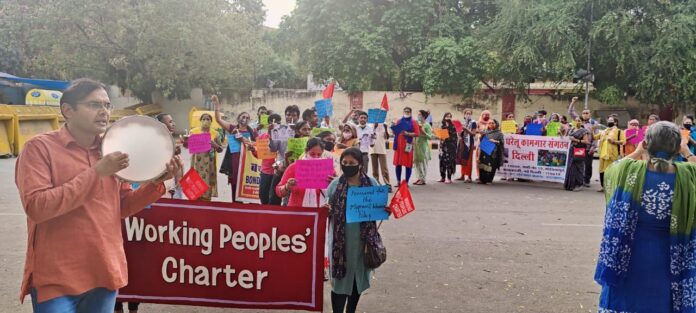
‘Government Must Notify A National Policy For Migrant Workers’
Abu Zaim | India Tomorrow
NEW DELHI—To mark the bitter and unforgettable memories of the unplanned lockdown imposed on march 23, 2020 by the Modi government abruptly, hundreds of workers gathered at the Jantar Mantar here in the national capital on Wednesday. They held a candle light march to vent their ire and grievances against the government as they were the ones who had to bear the brunt of covid-19 induced lockdown in the country which left a trail of death and devastation.
According to data, at least 989 deaths were directly attributable to the lockdown. However, these numbers are a gross underestimate because media reports are not a comprehensive representation of the overall death toll. Even then, these deaths indicate the humanitarian and health crises that the lockdown instigated.
The working people’s charter organized the Shaheed Diwas to highlight the plight of migrant workers and their miseries during the year 2020 after the ill-conceived lockdown was announced by the prime minister Narendra Modi.
Nirmal Gorana underlined the challenges faced by the migrant workers. He said the repercussions of these unforeseen event have severely impaired the working class.
Arguably, the year 2020, will go down in world history as the most difficult year; for countries, their governments, the economy and most of all for people across the globe. While in India, march 24, 2020 will be remembered not just for its nationwide covid-19 lockdowns, but its unprecedented, unparalleled impact on the country’s poor; namely, the 140 million strong migrant workers.

India witnessed the largest urban exodus in its history, with several workers arduously trying to reach their homes on foot, bearing the brunt of cashlessness, homelessness and starvation.
Perhaps the most heart wrenching and shameful news that haunts us was of the 16 workers who died en route home following a rail track near Aurangabad, Gorana said.
the fact that India’s migrant workers had to bear the most severe brunt of the lockdown needs no further belabouring. Neither does the fact that the migrant crisis unfolded due to problems that have been long standing and unaddressed across the country.
He said despite one year on, the predicament of these workers continues to persist and in many different ways. Those back in rural areas struggle to survive amidst lack of employment opportunities and a perpetually defunct rural welfare system. Work in urban areas across sectors continues to be scarcely available as the economy opens up. Wages are considerably lower, and so urban life continues to be difficult and undignified.
While we did witness several instances of state response to the problem, both during and after the lockdowns, India does not have a central, formidable policy or law to safeguard its migrant workforce, in spite the horrors of the exodus last year, is distressing and a huge cause for concern.
in memory of those who lost their lives either on the road trying to get back home, or those stranded without food and cash, the working people’s charter made demands to the state and central governments.
*The government of India needs to urgently formulate an overarching, nationwide policy to help migrant workers across the country.
*Urban employment guarantee, wage support, strong grievance redressal mechanisms, better facilitation of social security and entitlements and importantly, a long-term regulation of worksites, need to all find footing in the government’s larger vision of such a policy. Furthermore, it is imperative for the government to carefully review the recent labour codes; code on wages, 2019, the industrial relations code, 2020, the occupational safety, health and working conditions code, 2020 and the code on social security, 2020.
Evident from recent developments, is that covid is not going away anytime soon. A second wave seems imminent. Some state governments have already seen partial lockdowns, night curfews introduced a second time.
Gorana warned that if a second lockdown were to commence again, its impact on the poor is likely to be a lot more severe. There is no way that the country can afford another migrant crisis. In the interest of the safety of India’s most vulnerable citizens, central and state governments must act swiftly, but more importantly work together across party lines and differences.
While various worker organisations are doing their best to support these migrant workers in ensuring their rights. It’s high time, the government must notify a national policy for migrant workers formulated by Niti Aayog. Organizers said the government should give the working class an opportunity to gain a certain sense of social security as they have been long denied following the ignorance of the government in bringing these reforms on time.




